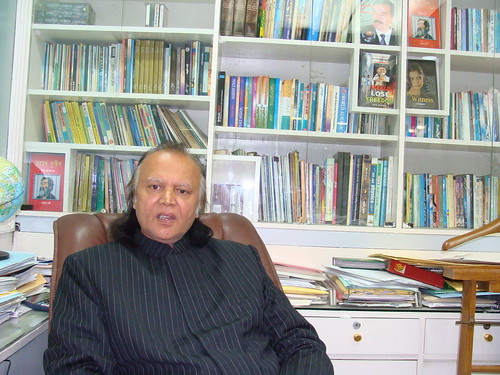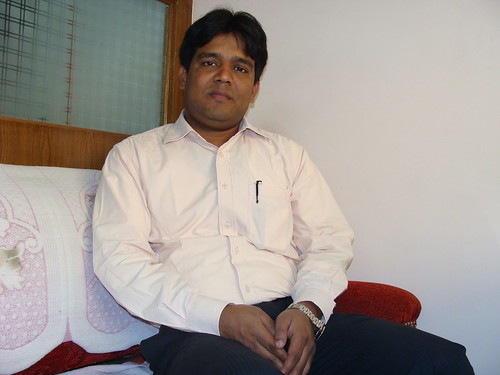By Mumtaz Alam Falahi, TwoCircles.net,
New Delhi: Urdu Editors in Delhi are unanimous that the biggest issue confronting Muslim community in India is their educational and economic backwardness. The role of Urdu Media in resolution of these issues is crucial. However, they admit they are not playing the role the way it should be. They are not presenting the issues of the community before the government perfectly. For lack of investigative journalism in Urdu Media, they blame lack of fund as well as lack of skilled manpower.
Mumtaz Alam Falahi of TwoCircles.net has talked to some prominent Urdu daily editors: Aziz Burney of Rashtriya Sahara, Hasan Shuja of Sahafat and Khalid Anwar of Hamara Samaj. Rashtriya Sahara is published from nine cities covering almost entire country, while Sahafat is published from New Delhi, Mumbai and Lucknow and Hamara Samaj, youngest of all, is coming out in New Delhi and Patna.

Aziz Burney, Editor, Rashtriya Sahara
Three major issues confronting the Muslim community in India
Aziz Burney: To blame them for division of the country, to brand them as communalists and to associate them with terrorism. All other issues – educational and economic backwardness – are the result of these three root issues.
Hasan Shuja: The biggest issue is educational backwardness. There is no village or town in North India where Muslims are well-educated. The second issue, which is ultimately is the result of the first, is economic backwardness.
Khalid Anwar: Three big issues confronting the Muslim community particularly in North India are: educational backwardness, economic backwardness and lack of discipline and organization within the community. They should look towards the South to know how Muslims there developed educationally with the help of the government. There is a need for making awareness about government policies meant for minorities.
Role of Urdu Media in the resolution of these issues
Aziz Burney: Role of Urdu Media is crucial. When Urdu Media can play key role in the freedom of the country, why can’t it play its role in the resolution of these issues? Need of awareness campaigns from madrasas, mosques, political institutions and Media

Khalid Anwar, Editor, Hamara Samaj
Hasan Shuja: With our pen and papers we should launch awareness campaign to tell the community about the reality of the time. They will have to improve themselves educationally and be part of the mainstream.
Khalid Anwar: The role of Urdu Media is great. But it is sad that Urdu Media is being damaged deliberately and a section of Muslims also neglect it. However, the bigger fault is with Urdu Media: they are not highlighting these issues of Muslims. Hardly there is any editorial on education in the Urdu press. Academic session starts and ends, but there is hardly any news on it.
The role of Urdu Media as link between the community and government
Aziz Burney: The 2009 General Elections are testimony to efforts of Roznama Rashtriya Sahara in bringing secular forces to the power. It can’t be said that Urdu Media is 100% successful in putting the issues of the community before the government. However, our daily and other Urdu periodicals are doing their bid.
Hasan Shuja: To a big extent, the Urdu Media is playing this role successfully. A number of good Urdu newspapers have come up in the recent past in North India. Some time back there was only Qaumi Awaz, now there are many and there is a healthy competition among them to highlight the community issues.
Khalid Anwar: In the last four-five years, the Urdu Media has started to play this role to an extent. That’s why now briefings of Urdu newspapers are being taken in government departments and agencies. But to be honest, the Urdu Media is not presenting the issues of Muslim community before the government and the world perfectly.
As for investigative journalism, why there is no Indian Express or Tehelka in Urdu?
Aziz Burney: No paper can compete with Rashtriya Sahara in investigative journalism. True, our focus is different. If I am to expose a ministry, an institution or an individual, I can go to some extent, but I give primary concern to the interests of the community and the country. I have written on 9/11, 26/11, Batla House encounter, Vande Mataram the way none can. Rashtriya Sahara has created history.
Hasan Shuja: Urdu Media lack resources. We are neglected by the government departments in distribution of ads. DAVP is the biggest government agency that issues ads but they don’t know about Urdu – which Urdu periodical is better or larger. They just know about English papers. We do have skilled people to do such journalism but we lack funding to hire them and sustain them. How can we expect low-wage workers to do reporting like Indian Express and Tehelka?
Khalid Anwar: Urdu Media hasn’t yet got any big industrialist group or financer who has love for Urdu and Urdu community. Some came but with their own personal interests. Professionally, we hardly find any paper in Urdu. They are not more than a dummy paper. If we have resources like Indian Express or Times of India have, we see large opportunities in Urdu Media. Moreover, Urdu Media also lack skilled manpower. Even for routine news, we do not have sufficient staff, let alone investigative stories which require both skilled people and fund.

Hasan Shuja, Editor, Sahafat
Challenges before Urdu Media
Aziz Burney: The whole world is frightened with Urdu Media. When Britishers left India they said their rule was finished by Urdu Media. So though they left the country, they left behind English to rule over us. Despite being national language even Hindi has been overshadowed by English. All roads to progress have been shut on Urdu. The Urdu Media is not given even 1% of the government ads. Hindi gets only 6% while more than 80% goes to English Media.
Hasan Shuja: Lack of proper fund, negligence from the government. We don’t know if PM, Sonia or Delhi Chief Minister care for the Urdu Media to know what is happening to them.
Khalid Anwar: Lack of funding and lack of skilled people. For decades after Independence the government was told that Urdu has finished but Urdu persons did not come up to tell the truth. However, over the last one decade, there has been a sort of renaissance of Urdu in the country. Good papers are brought out. They are getting a portion of government ads. There may be some discrimination against Urdu in some government departments but there is no such policy of discrimination from the government.

